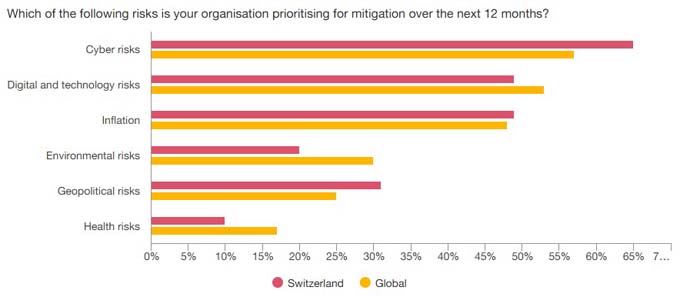Swiss companies are increasingly focusing on cyber security as a strategic advantage
Swiss companies are prioritizing cyber risks and increasing their budget for cyber security. The "Global Digital Trust Insights 2025" survey shows that cloud threats and regulatory requirements are key issues for Swiss companies. Cybersecurity is also increasingly becoming a strategic competitive advantage.

Cyber risks remain the top priority
Once again this year, 65 % of Swiss executives consider cyber risks to be the most pressing challenge for the next twelve months - significantly more than the global and European comparison, which both stand at 57 %. This figure underlines the growing importance of cyber security in an increasingly complex threat landscape.

While 54 % of Swiss companies planned to increase their cybersecurity spending in 2023, this figure rose to 70 % in 2024. Looking ahead to 2025, 67 % of Swiss companies and 77 % worldwide intend to further increase their cybersecurity budgets. 22 % of Swiss companies want to keep their cybersecurity spending the same, while only 11 % worldwide plan to do so.
"In an international comparison, Swiss companies are more stable," explains Urs Küderli, Partner, Head of Cybersecurity and Privacy, PwC Switzerland. "Worldwide, significantly more companies are increasing or reducing their expenditure, while only a few are sticking to their budgets. Swiss companies continue to focus on moderate growth and want to stick to this course."
Cloud attacks and extended attack surfaces as key risks
The attack surface for cyber threats is constantly growing. Advances in artificial intelligence, the increased use of cloud technologies and dependence on third parties are creating additional challenges. Cloud-based attacks, hack-and-leak operations and attacks on networked products are considered particularly critical. 49 % of Swiss managers consider cloud-based threats to be the greatest danger. At the same time, many companies do not feel sufficiently prepared to counter these threats effectively.
"On the one hand, cloud technologies enable innovation and efficiency," says Johannes Dohren, Partner and Head of Cyber Resilience and Defense at PwC Switzerland. "On the other hand, however, they increase the attack surface for cyber threats - which is why companies must consistently accompany their cloud strategy with a robust cyber strategy."
Regulatory requirements
Swiss executives often view the impact of cyber regulation more positively than their global counterparts. 28 % emphasize that the regulations help to create clear guidelines for technological innovation and transformation. In addition, 24 % - more than the global average of 20 % - report increased resilience through uniform regulation and industry standards. At the same time, only 18 %s of Swiss executives feel that regulations are so demanding that they require major improvements to their systems, compared to 24 %s globally.

"Swiss companies, especially those in sectors that have been heavily regulated for a number of years, have already established a basic security standard or are used to the regulatory influence and can therefore rely more on their existing systems and partnerships," explains Urs Küderli. "Nevertheless, coordination between the security teams, risk functions and the management level is crucial in order to meet the regulatory challenges. Only with such coordination can organizations maintain compliance readiness and drive strategic improvements."
Cybersecurity as a strategic advantage
Cybersecurity is increasingly seen as a key competitive advantage for organizations. In Switzerland, this advantage is primarily realized through customer trust, with 55 % of companies positioning cybersecurity as a driver of trust - close to the global average of 57 %. Cybersecurity is becoming a key element of trust and competitive advantage. Companies that proactively adapt their strategy and see resilience as a strategic advantage will position themselves better in an increasingly digital environment. "It's no longer just about protection. Cybersecurity has become a key differentiator," explains Urs Küderli. "Organizations must integrate cyber security into all business decisions in order to be successful in the long term."
About the study
The Global Digital Trust Insights Survey captures the views of executives on the challenges and opportunities for improving and transforming cybersecurity in organizations over the next 12 to 18 months. The survey covers 4042 respondents in 717 countries (51 of them from Switzerland).
Source: www.pwc.ch









